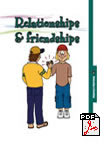- TOOL KITS
- A. The NEXT Step
- B. Promoting Independence
- C. Phone Apps
- D. Return to Work
- E. Motivational Interviewing
- F. Paediatric Brain Injury Rehabilitation Resources
- a) Introduction
- 0. Introduction
- 1. Transition
- 2. The transition wheel
- 3. Walking around the transition wheel
- 4. The transition wheel interview
- 5 . Using this kit
- 6 . Web resources
- b) Working together
- 7. My role
- 8 . My family's role
- 9. My case manager's role
- c) What can I do?
- 10. Who, where, what? The Services I receive
- 11. Accommodation
- 12. Driving
- 13.Alcohol and drugs
- 14. Social and recreational activities
- 15. Health and well-being
- 16. Relationships and friendships
- 17. Sexuality
- 18. Personal safety
- 19. Complaints/rights
- 20. Legal issues
- 21. Centrelink
- 22. Financial
- 23. Shopping
- 24. Employment, training and tertiary education
16. Relationships and friendships
You will have many different types of relationships with people. Most people find that they have the following relationships:
1. People that you do not know
These may be people that you have only talked with once, such as a shop assistant.
2. Acquaintances
Are people who you see regularly. You know their name and have general conversations with them but you do not know a lot about them. Acquaintances could be your sport coach, your teachers or some young people in your class.
3. Friends
Are people that you do things with. You share your personal worries and stories with these people and you are able to ask them personal questions. You may have friends at school, in your club and in your neighbourhood.
4. People that you are closest to
Are the people with whom you share your most private details of your life. You are very comfortable around these people and know they will be there for you when you need them. The people you are closest to may be your parents, your best friend or best mate or your grandparents.
(Adopted from ‘Getting It All Together’. Brain Injury Rehabilitation Unit South Western and Southern Sydney Area Health Service, 1999.)
When you are at school, it is usually easy to keep in touch with your friends because you see them everyday. After you leave school it might not be as easy. You and your friends will start to develop different interests, study different things or get jobs in different parts of town. You will also meet new people that you might want to have as friends.
One thing is for certain: you cannot have too many friends!
Here are some hints to help you keep your old friends as well as make some new ones:
- Make sure that you have a contact phone number or mobile number for all your school friends.
- Store your phone numbers in a safe place like an address book, diary, personal organiser or the contacts list in your mobile phone.
- Make it a habit to contact your friends regularly, such as once each week. They will enjoy hearing about what you have been doing and you may enjoy hearing about what they have done. Remember that it is important to listen to others as well as to talk.
- Remember to plan ahead. When you are planning your activities and want your friends to join you, make sure you give them enough notice. If you call friends at the last moment they may be busy or just not able to organise themselves in time.
- If you are starting a new sport or leisure activity ask a friend to come along.
- If a friend asks you to go somewhere write all the information down so you do not forget. Your diary or organiser is a good place to do this but some people use a whiteboard or ‘Post It’ notes.
- Everyone likes to be remembered, especially on their birthday. When you were at school your parents probably reminded you about special occasions. Now you need to start remembering these yourself. Record special days for your friends and family in your diary, organiser or calendar and remember to do something special for them on this day.
- A good way to meet new people is to join some groups in your local area. This is a great way to meet people who are interested in something that you find enjoyable. You might want to join a leisure group, social club, sporting group or a church.
If you want more information about relationships or friendships talk with:
- Your Brain Injury Rehabilitation Unit
- A Social Worker
- A Psychologist
- The Brain Injury Association of NSW
Other useful tools
Use Toolkit B Promoting Independence. See especially Section 9 Relationships


